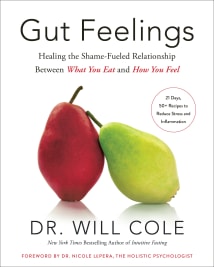The Stress & Blood Sugar Connection We Don't Talk About Enough


Chances are that you or someone you know has a blood sugar problem.
The statistics are shocking. Sadly, seven out of the top 10 1causes of death for Americans are chronic diseases, and most of them are tied to dysfunctional blood sugar.
Over 120 million Americans have prediabetes or diabetes, and nine of the 10 leading causes of death in the United States are caused or worsened by metabolic dysfunction. There are an estimated2 96 million Americans with prediabetes; 70% of these people will be diabetic within 10 years, and 84% of people with prediabetes do not know they have it.
All of these blood sugar issues come back to one hormone called insulin, which is responsible for taking the sugars from the foods you eat and shuttling them into your cells, where the sugars can be converted into energy to power your body.
When you eat a food high in sugars or carbohydrates, especially when it doesn't contain much fiber, that food is quickly converted into sugar in your bloodstream, triggering the release of insulin to take the sugar out of your blood and send it to your muscles and cells to be used right away or to your liver to be stored for when you need it later.
But here's the thing: You need only so much glucose, and if you eat a lot of sugar-rich and carb-rich foods all the time, your body may have trouble keeping up with the demand.
Unfortunately, eating too many sugar- and carb-rich foods is the norm in our society.
The consequence is insulin resistance, which is when your body builds up a tolerance to insulin. In response, your body needs to produce more and more insulin to try to get the glucose in your blood into your cells. If your body can't keep up and it develops insulin resistance, you get chronically high blood sugar or Type 2 diabetes.
The blood sugar problem in our country isn't a secret. You're probably already aware of the dangers of diabetes and what you need to do to prevent it. What isn't common knowledge is the fact that blood sugar health is intricately connected to our gut and our stress levels.
Currently, there's a great focus on high blood sugar being caused by too much sugar intake, but the truth is that the causes of diabetes are more complex than that and are intricately related to the gut and our stress levels.
You can draw many lines between blood sugar health and the gut-feeling connection.
Your gut health plays a key role in blood sugar regulation and insulin resistance.
A study from the Center for Individualized Medicine at the Mayo Clinic3 followed a group of 300 over the course of six days. The researchers tracked glycemic responses to foods and found that they could only accurately predict blood sugar between 32% and 40% of the time when they took into consideration simply what foods the subjects ate and how many calories they consumed. But when the scientists factored in the specific composition of the microbiomes of participants, they were able to accurately predict blood sugar response 62% of the time.
In another fascinating study5, scientists were able to transplant the microbiome of diabetic mice into healthy mice to make them diabetic as well—without changing what the mice were eating at all. It's also been postulated that changes in the gut microbiome lead to metabolic issues, which lead to a type of low-grade chronic inflammation that puts you at risk for obesity and diabetes.
I can't move on from the topic of insulin without talking about negative emotions since there's a clear connection between the two.
These days, stressful events like family losses or trouble at work are well known to be risk factors for triggering the onset of diabetes6. In addition, studies have shown that traumatic experiences, family chaos, and behavioral problems during childhood are also linked to diabetes7.
So what explains this connection? It turns out that the main stress hormone, cortisol, causes blood sugar levels to go up8. Technically, this is an evolutionary adaptation. When we're trying to fight or flee, we need immediate sugar in our blood to fuel our muscles and cells to get out of a dangerous situation.
It, therefore, makes sense that when we encounter a threat, our body does what it's designed to do, stopping digestion and other less critical bodily processes, like repair and cleanup mechanisms, and funneling its resources to the heart, brain, and muscles. The only problem occurs when stress is chronic. Too much cortisol for too long can lead to chronically high blood sugar, which can contribute to diabetes and insulin resistance.
If you've got a blood sugar issue, I'm sure that your gut-feeling connection is playing an important role in your imbalance, and that healing will require an approach that tackles both the physical causes of blood sugar imbalances—such as gut microbiome imbalances and excess sugar intake—and the emotional ones, such as chronic stress or the effects of trauma.
Excerpt courtesy of Gut Feelings: Healing the Shame-Fueled Relationship Between What You Eat and How You Feel. Copyright © 2023 by Will Cole. Published by goop Press, an imprint of Penguin Random House.

Will Cole, IFMCP, DNM, D.C., is a leading functional medicine expert who consults people around the globe, starting one of the first functional medicine telehealth centers in the world. Named one of the top 50 functional and integrative doctors in the nation, Dr. Will Cole provides a functional medicine approach for thyroid issues, autoimmune conditions, hormonal imbalances, digestive disorders, and brain problems. He is the host of the popular The Art Of Being Well podcast and the New York Times bestselling author of Intuitive Fasting, Ketotarian,The Inflammation Spectrum, and the brand new book Gut Feelings: Healing the Shame-Fueled Relationship Between What You Eat and How You Feel.
8 Sources
- https://www.who.int/news/item/09-12-2020-who-reveals-leading-causes-of-death-and-disability-worldwide-2000-2019
- https://www.cdc.gov/diabetes/basics/prediabetes.html#
- https://www.ncbi.nlm.nih.gov/pmc/articles/PMC6531887/
- https://pubmed.ncbi.nlm.nih.gov/22064556/
- https://www.nature.com/articles/nature13793
- https://pubmed.ncbi.nlm.nih.gov/33349728/
- https://pubmed.ncbi.nlm.nih.gov/36800323/
- https://www.ncbi.nlm.nih.gov/books/NBK538239/
